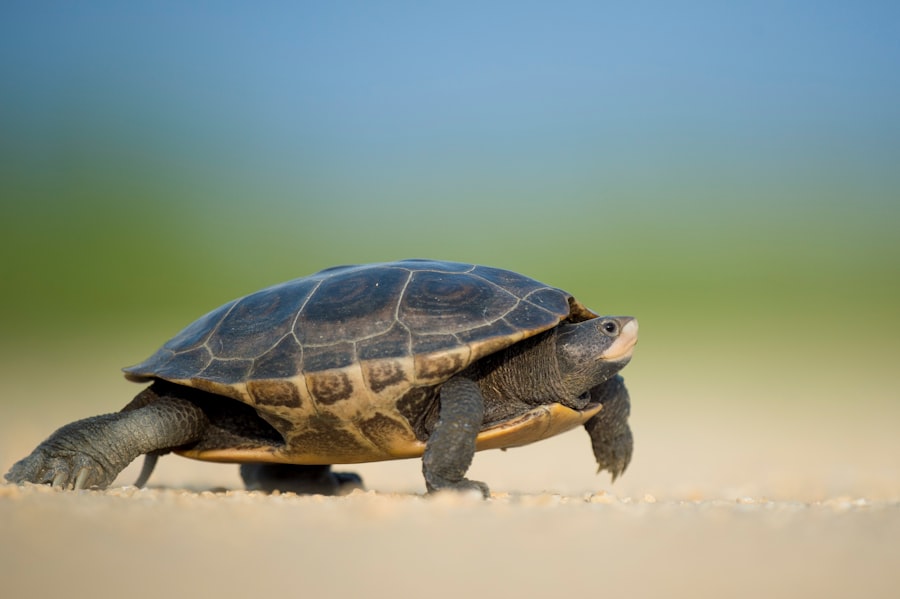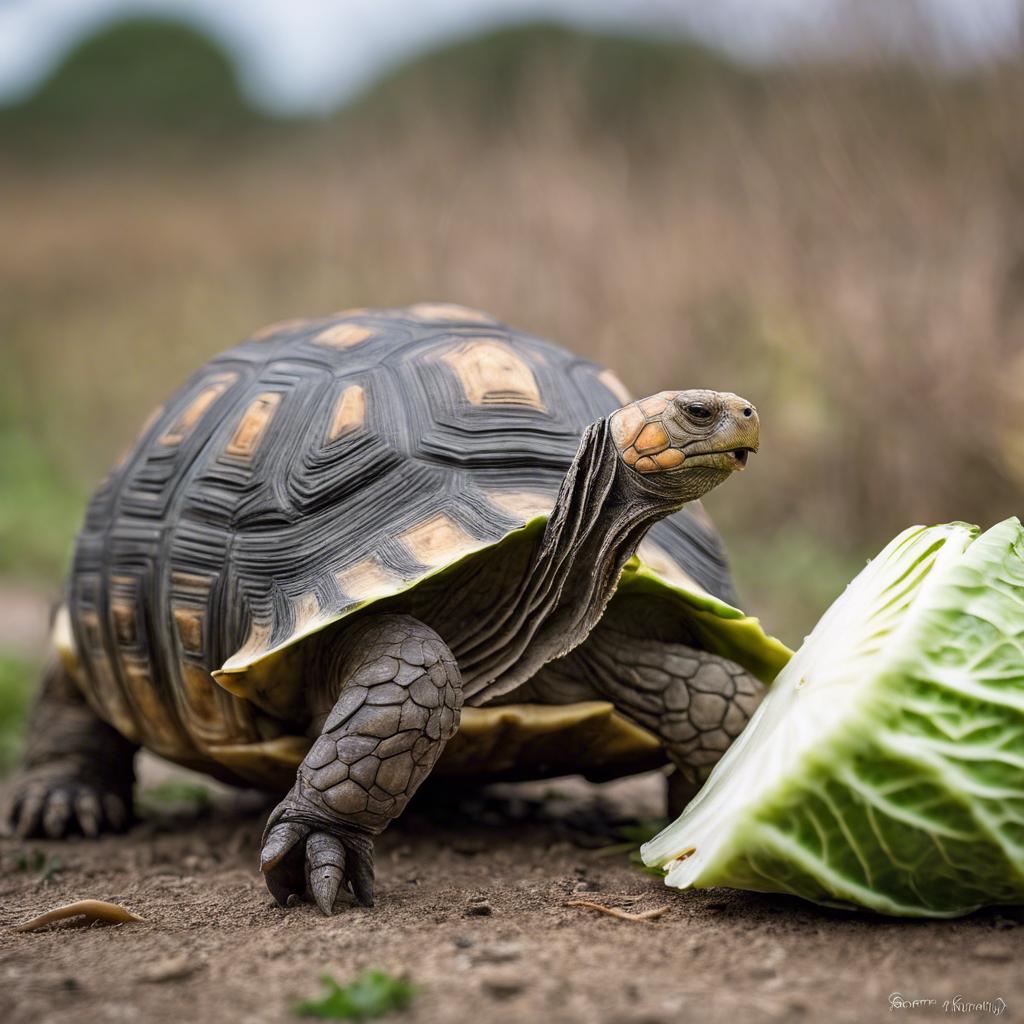Feeding cabbage to tortoises is a topic that has gained attention among tortoise owners and enthusiasts. As responsible pet owners, it is important to provide our tortoises with a balanced diet that meets their nutritional needs. Cabbage is one vegetable that can be included in a tortoise's diet, as it offers several nutritional benefits. In this article, we will explore the nutritional benefits of cabbage for tortoises, how to prepare cabbage for your tortoise, the risks of overfeeding cabbage, the importance of variety in a tortoise's diet, other vegetables that can be fed to tortoises, how to monitor your tortoise's health and digestion, tips for introducing cabbage into your tortoise's diet, the role of cabbage in a balanced tortoise diet, common misconceptions about feeding tortoises cabbage, and how to balance cabbage with other foods in a tortoise's diet.
Key Takeaways
- Cabbage is a nutritious addition to a tortoise's diet, providing vitamins and minerals.
- To prepare cabbage for your tortoise, chop it into small pieces and remove the tough stem.
- Feeding too much cabbage can lead to digestive issues and thyroid problems in tortoises.
- A varied diet is important for a tortoise's health, including other vegetables like kale and collard greens.
- Monitor your tortoise's health and digestion when introducing cabbage into their diet, and balance it with other foods.
The Nutritional Benefits of Cabbage for Tortoises
Cabbage is a nutrient-rich vegetable that can provide several health benefits for tortoises. It is a good source of vitamins A and K, which are essential for maintaining healthy eyesight and promoting blood clotting. Cabbage also contains vitamin C, which helps boost the immune system and aids in collagen production. Additionally, cabbage is rich in fiber, which promotes healthy digestion and prevents constipation in tortoises.
Furthermore, cabbage contains minerals such as calcium and potassium, which are important for maintaining strong bones and muscles. Calcium is especially crucial for tortoises, as it helps prevent metabolic bone disease, a common condition in reptiles. Potassium helps regulate fluid balance and supports proper nerve and muscle function.
How to Prepare Cabbage for Your Tortoise
When preparing cabbage for your tortoise, it is important to wash it thoroughly to remove any dirt or pesticides. Start by removing the outer leaves of the cabbage, as they may be tough and difficult for your tortoise to chew. Cut the cabbage into small, bite-sized pieces that are easy for your tortoise to consume. It is recommended to steam or blanch the cabbage before feeding it to your tortoise, as this can make it easier to digest. Avoid adding any seasonings or oils to the cabbage, as these can be harmful to your tortoise.
The Risks of Feeding Too Much Cabbage to Tortoises
While cabbage can be a nutritious addition to a tortoise's diet, it is important to feed it in moderation. Feeding too much cabbage to tortoises can lead to digestive issues such as diarrhea or bloating. This is because cabbage contains compounds called goitrogens, which can interfere with thyroid function and affect digestion. Additionally, cabbage is high in water content, which can cause watery stools if consumed in excess.
To avoid these risks, it is recommended to feed cabbage as part of a varied diet and not as the sole food source for your tortoise. It is also important to monitor your tortoise's digestion and adjust the amount of cabbage accordingly. If you notice any signs of digestive upset, such as loose stools or decreased appetite, it is best to reduce or eliminate cabbage from their diet.
The Importance of Variety in a Tortoise's Diet
Feeding a variety of foods is crucial for maintaining a healthy tortoise. Just like humans, tortoises require a diverse range of nutrients to support their overall health and well-being. By offering a variety of vegetables, fruits, and other plant-based foods, you can ensure that your tortoise receives all the essential nutrients they need.
A varied diet can also help prevent boredom and encourage natural foraging behaviors in tortoises. By providing different textures, flavors, and colors of food, you can keep your tortoise engaged and stimulated during mealtime. This can also help prevent picky eating habits and ensure that your tortoise receives a balanced diet.
Other Vegetables That Can Be Fed to Tortoises

In addition to cabbage, there are several other vegetables that are safe and nutritious for tortoises to eat. Some examples include:
1. Leafy greens: Tortoises can enjoy a variety of leafy greens such as kale, spinach, and dandelion greens. These greens are rich in vitamins and minerals, and they provide a good source of fiber.
2. Bell peppers: Bell peppers are a great source of vitamin C and antioxidants. They come in different colors, such as red, yellow, and green, which adds variety to your tortoise's diet.
3. Carrots: Carrots are high in beta-carotene, which is converted into vitamin A in the body. Vitamin A is essential for maintaining healthy eyesight and promoting immune function.
4. Squash: Squash varieties such as butternut squash and zucchini are rich in vitamins A and C, as well as fiber. They can be steamed or baked before feeding to your tortoise.
5. Broccoli: Broccoli is a nutrient-dense vegetable that provides vitamins A, C, and K, as well as fiber. It is best to feed broccoli in moderation due to its goitrogen content.
How to Monitor Your Tortoise's Health and Digestion
Monitoring your tortoise's health and digestion is important to ensure they are thriving on their diet. Here are some tips for monitoring your tortoise's health:
1. Observe their behavior: Pay attention to any changes in your tortoise's behavior, such as decreased appetite, lethargy, or changes in bathroom habits. These can be signs of underlying health issues.
2. Check their shell: Regularly inspect your tortoise's shell for any abnormalities, such as cracks, soft spots, or discoloration. A healthy shell should be smooth and firm.
3. Weigh your tortoise: Weighing your tortoise regularly can help you track their growth and ensure they are maintaining a healthy weight. Sudden weight loss or gain can indicate health problems.
4. Monitor their digestion: Keep an eye on your tortoise's bowel movements to ensure they are regular and formed. Loose stools or diarrhea can be a sign of digestive issues.
If you notice any concerning symptoms or changes in your tortoise's health, it is best to consult a veterinarian who specializes in reptiles.
Tips for Introducing Cabbage into Your Tortoise's Diet
When introducing cabbage into your tortoise's diet, it is important to do so gradually. Start by offering small amounts of cabbage and observe how your tortoise reacts to it. If they tolerate it well and show no signs of digestive upset, you can gradually increase the amount of cabbage over time.
It is also important to offer a variety of other vegetables alongside cabbage to ensure a balanced diet. This will help prevent your tortoise from becoming reliant on one type of food and ensure they receive all the necessary nutrients.
The Role of Cabbage in a Balanced Tortoise Diet
Cabbage can play a role in providing essential nutrients and variety in a balanced tortoise diet. By including cabbage in their diet, you can provide vitamins A, K, and C, as well as fiber and minerals such as calcium and potassium. These nutrients contribute to a tortoise's overall health and support various bodily functions.
However, it is important to remember that cabbage should not be the sole food source for your tortoise. It should be offered as part of a varied diet that includes other vegetables, fruits, and plant-based foods. This will ensure that your tortoise receives all the necessary nutrients for optimal health.
Common Misconceptions About Feeding Tortoises Cabbage
There are some common misconceptions about feeding tortoises cabbage that need to be addressed. One misconception is that cabbage is toxic to tortoises. While it is true that cabbage contains goitrogens, which can interfere with thyroid function, it is safe to feed in moderation. By offering cabbage as part of a varied diet and monitoring your tortoise's digestion, you can avoid any potential risks.
Another misconception is that tortoises should only be fed a strict diet of grasses and weeds. While grasses and weeds are important components of a tortoise's diet, they should be supplemented with other vegetables and plant-based foods to ensure a balanced diet. Cabbage can be a valuable addition to this varied diet.
Balancing Cabbage with Other Foods in a Tortoise's Diet
To create a balanced diet for your tortoise, it is important to offer a variety of foods and ensure they receive all the necessary nutrients. Cabbage can be balanced with other vegetables, fruits, and plant-based foods to provide a diverse range of nutrients.
For example, you can offer leafy greens such as kale or spinach alongside cabbage to provide additional vitamins and minerals. You can also include other vegetables such as bell peppers or carrots for added variety. Additionally, offering fruits such as berries or melons in moderation can provide natural sugars and antioxidants.
It is important to remember that each tortoise may have different dietary needs and preferences. It may take some trial and error to find the right balance of foods for your tortoise. Consulting with a veterinarian who specializes in reptiles can provide guidance on creating a balanced diet for your specific tortoise.
Feeding cabbage to tortoises can be a nutritious addition to their diet when done in moderation and as part of a varied meal plan. Cabbage provides several health benefits due to its nutrient content, including vitamins A, K, and C, fiber, and minerals such as calcium and potassium. By preparing cabbage properly and monitoring your tortoise's health and digestion, you can ensure they receive the benefits of cabbage without any potential risks.
It is important to remember that cabbage should not be the sole food source for your tortoise. A balanced diet that includes a variety of vegetables, fruits, and plant-based foods is essential for their overall health and well-being. By offering a diverse range of foods and monitoring their health, you can provide your tortoise with a nutritious and enjoyable diet.
If you're curious about what other vegetables tortoises can eat, you might find this article from Reptile Wizard interesting. They discuss the topic in detail and provide valuable insights on the dietary needs of tortoises. You can check it out here.
FAQs
What is a tortoise?
A tortoise is a reptile that belongs to the family Testudinidae. They are known for their hard, protective shells and slow movements.
Can tortoises eat cabbage?
Yes, tortoises can eat cabbage. However, it should only be given to them in moderation as it is high in goitrogens which can interfere with their thyroid function.
What other foods can tortoises eat?
Tortoises can eat a variety of vegetables such as kale, collard greens, and carrots. They also enjoy fruits like strawberries and bananas. It is important to research the specific dietary needs of your tortoise species.
Can tortoises eat meat?
No, tortoises are herbivores and should not be fed meat. Feeding them meat can cause health problems and even be fatal.
How often should I feed my tortoise?
The frequency of feeding depends on the age and species of your tortoise. Generally, adult tortoises should be fed every other day while younger tortoises may need to be fed daily. It is important to not overfeed your tortoise as obesity can lead to health problems.

